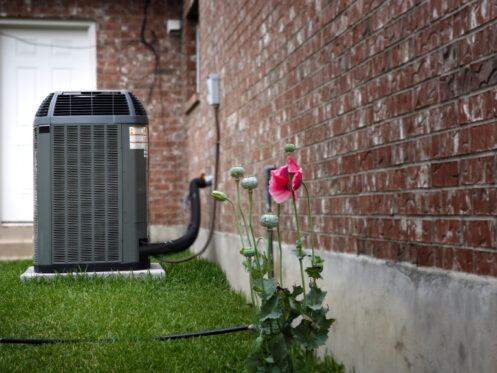Beach Park, IL, experiences severe winter weather with freezing temperatures. Every home in the state needs an HVAC system that is going to keep them warm and safe during these challenging months. When the time has come to replace your existing system, the prospect can be a bit daunting. A great deal has changed in the industry since your original unit was installed. Here are eight tips that should ease the process of choosing the right HVAC system.
Tip #1: Start With Choosing the Right HVAC Company
Select an established HVAC company that you can trust, and get them involved in the process right away. The professional guidance and answers to your questions that they will provide will be invaluable. Most reputable HVAC contractors provide consultations at no cost and without obligation. If you choose to proceed with that contractor, theyll not only be able to help you choose the right type of HVAC system but also ensure that its sized appropriately for your particular home. Estimating size based on square footage is a quick method, but a professional will perform a more precise Manual J calculation that factors in square footage and:
- Climate zone
- Ductwork design
- Number of residents
- Natural shade and sunlight
- Insulation amount and quality
- Other heat-generating appliances
- Style and number of windows and doors
Tip #2: Look Into Ways to Save Money
Be sure to investigate your eligibility for a tax credit. You can ask your HVAC professional about potential savings. You can also find more information on Energy.gov and local utility websites. Consider that between 2023 and 2032, you can get a tax credit for heat pump installation worth 30% of the total cost, up to $2,000 per year.
Credits are available for energy-efficient boilers as well. Its also important to note that the savings arent limited to the federal government. Check with your local utility company, as theyll be able to provide information about rebates offered by the state, the manufacturer, and other organizations.
Tip #3: Consider a Heat Pump
Heat pumps havent traditionally been an option in Beach Park due to the equipment becoming inefficient in extreme temperatures. However, that has changed with advancements in technology. There are several options. Geothermal heating is the most effective and efficient. Its also the most expensive, but if you can afford the initial investment, it will be worthwhile. The second option is to choose a high-efficiency air-source heat pump that will handle the colder temperatures. Your third option is a dual-fuel system, which is one of the most common ways residents are transitioning to heat pumps. In this setup, you have a heat pump that runs most of the time and a furnace that kicks on when temperatures drop too low. Another advantage of choosing a heat pump is that you now have air conditioning as well.
Tip #4: Gas vs. Electric Heat
Gas versus electric heat is often a matter of preference. Many people prefer gas heat, as it feels like a more reliable form of heat. The reason for this is that gas heaters heat air to a much higher temperature, which is above your body temperature. Electric heat, on the other hand, heats the air to about 25 to 45 degrees less. This is below your body temperature. Its still high enough to heat your home to the desired level, but you may not feel as warm when the hot air is blowing. Its important to note that if you choose electric, you will likely become accustomed to it and wont notice any differences.
Tip #5: Understanding Energy-Efficiency Ratings
There are a number of different energy-efficiency ratings available, depending on the type of HVAC system youre considering. These ratings give consumers an idea of how efficient a unit is relative to competitors. The most efficient system available may not be the most financially efficient. The goal should be to hit the mark based on the climate zone, budget, and expected lifespan of the equipment. This is why its so invaluable to have an HVAC professional help you make this determination.
AFUE, or Annual Fuel Utilization Efficiency, is a metric used to evaluate furnaces and boilers. The minimum percentage allowed by federal law is currently 80%. The higher the rating, the more efficient it will be. High-efficiency units have an AFUE of 90% or above.
HSPF, or Heating Seasonal Performance Factor, is used to rate heat pumps. In order for a heat pump to earn the Energy Star label, it must have an HSPF of at least 8.2.
Seasonal energy efficiency ratio, or SEER, is used to rate both air conditioners and heat pumps. An Energy Star heat pump must have a SEER of 12 or higher. Note that SEER2 has recently been introduced as an improved formula, and the original SEER will become obsolete over time.
Tip #6: If You Choose a Furnace, Consider Gas
If you choose a furnace either as a standalone heating solution or as part of a dual-fuel system, opt for gas if your home has a natural gas connection. You may also consider heating oil or propane. While electric is more efficient and less expensive, at least initially, the gas unit will be less expensive to operate and maintain over the life of the equipment.
Tip #7: Zoning Can Save You Money Long Term
Having a zoned HVAC system makes your home more comfortable. You can set different temperatures for particular areas of the home. It can also save you considerable money and pay for itself over the life of the equipment. At night during the winter, your bedroom can be set to the toasty temperature you find comfortable, while the rest of the house is at a much lower setting.
Tip #8: Consider HVAC System Add-Ons
HVAC replacement is the perfect time to upgrade your system with features you didnt previously have. These new additions can save you money and make your home more comfortable. The three core add-ons we recommend considering are mechanical ventilation, whole-home humidity control, and air purification. An energy-recovery ventilator will help combat indoor air pollution while making your HVAC system even more efficient in the winter. Low relative humidity is a byproduct of heating your home. A humidifier will provide a healthier environment and make you comfortable in a lower-heat setting. An air purifier will combat indoor air pollution even more, including removing viruses and bacteria.
Your Local HVAC System Pros Serving Lake County and the Surrounding Areas
Modern Heating and Plumbing has been serving Beach Park and the neighboring communities since 1948. We have more than 75 years of experience helping area families stay comfortable year-round. In addition to a full range of heating services, we perform furnace installation, AC installation, maintenance, and repair. We also install humidifiers and dehumidifiers. You can count on us for plumbing services, including water heater installation.
Call Modern Heating and Plumbing today or contact us online through our website with any questions you may have or to schedule an appointment.


